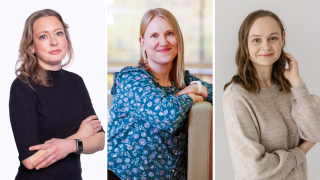Psychological development in adulthood surprises – Mental well-being remains high

Change and stability in adult development
Psychological development in middle and late adulthood is still relatively under-researched. These life stages are often associated with negative perceptions, such as midlife crises or preparing for loss. However, Reinilä’s study did not support these views.
"The results showed that mental well-being remained at a relatively high level between the ages of 42 and 61,” says doctoral researcher Emmi Reinilä. “Furthermore, the relative order of participants in terms of well-being remained highly stable across age stages.”
The study also followed the development of generativity, that is, the concern to care for, support and guide the next generation, from middle adulthood to the beginning of late adulthood. According to traditional theories, this concern typically increases during midlife. Contrary to expectations, however, generativity was found to decrease between ages 42 and 61, although individual differences in its development were observed.
"Although the desire to care for and support the next generation generally declined, some individuals showed an increase with age,” Reinilä explains. “The development of generativity was explained by its earlier development and by social well-being. Better social well-being was associated with a stronger desire to support the next generation eight years later.”
Emotional well-being and health go hand in hand
The dissertation showed that emotional well-being—measured through life satisfaction and positive and negative mood—was linked to individuals’ perceptions of their own health. Both emotional well-being and subjective health predicted each other even 11 years later.
“The relationship between emotional well-being and subjective health appears to be bidirectional. When people feel physically better, they may experience greater satisfaction with life. Conversely, a positive mood may help reduce the experience of symptoms,” Reinilä says.
Generativity and mental well-being support continued work life
Generativity and mental well-being may also play a role in decisions about continuing work as retirement approaches. The study found that individuals reporting higher mental well-being and a stronger desire to support the next generation were more likely to want to retire at the earliest possible age or continue working after retirement.
“Providing employees with opportunities to express generativity—such as through mentoring—and supporting well-being throughout their careers can benefit both individuals and the workplace,” Reinilä notes.
The dissertation is part of the TRAILS project (Individual developmental pathways to life transitions at age 60), which is the latest phase of the JYLS study. TRAILS was funded by the Academy of Finland (2019–2023). This doctoral dissertation also received funding from the Finnish Cultural Foundation. The study was conducted at the Faculty of Sport and Health Sciences at the University of Jyväskylä and the Gerontology Research Center (GEREC), a collaboration between the Universities of Jyväskylä and Tampere.
Emmi Reinilä’s doctoral dissertation in health sciences, titled “Psychological development from middle adulthood to the beginning of late adulthood: Generativity and mental well-being and their associations with health and retirement preferences”, will be publicly examined at the Faculty of Sport and Health Sciences, University of Jyväskylä, on Friday, November 14, 2025, at 12:00. The event can be followed online. The opponent will be Docent Laura Pulkki-Råback (University of Helsinki), and the custos will be Research Director Katja Kokko (University of Jyväskylä). The defence will be held in Finnish.
The dissertation is available in the JYU Dissertations online publication series.






